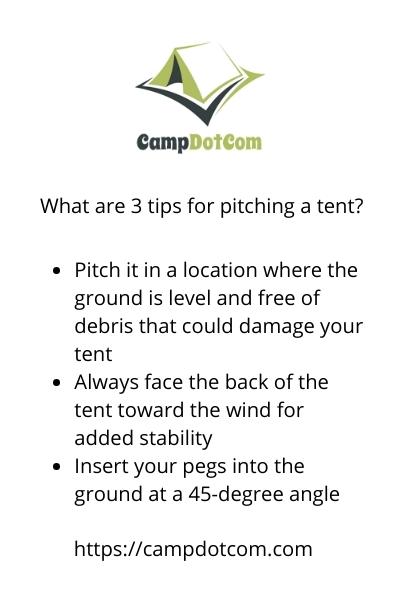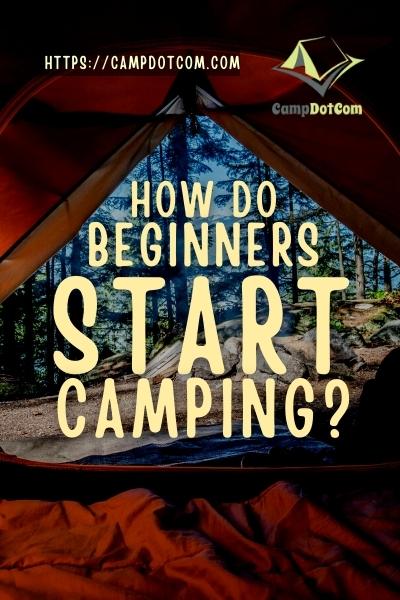Camping is a terrific way to get out in nature, get some fresh air, and spend quality time with friends and family. Camping can be difficult for beginners and inexperienced campers, so here are our top recommendations to make your first camping trip fun and stress-free.

More Things To Know About How Do Beginners Start Camping?

1. Select Your Campsite Wisely
There will be a wide range of campgrounds from which to pick. Check to see if they are deemed 'kid-friendly,' if dogs are permitted and if facilities like toilets and showers are available.
As a first-time camper, it's a good idea to reserve a campsite with high-quality facilities and a town nearby so you have plenty of options for food and supplies if you miss something.
2. Buy The Right Tent
Tents come in a variety of shapes and sizes, and it's critical to select the one that's best for you. It's a good idea to choose a tent that's a size or two larger than the number of people who will be using it.
As an Amazon Associate, I earn from qualifying purchases. Some of the links in this article are affiliate links. This means that, at zero cost to you, I will earn an affiliate commission if you click through the link and finalize a purchase.
This will provide you ample space in the tent to store your gear while also providing a pleasant sleeping area.
3. Buy The Best Sleeping Bag
Whatever time of year you choose to camp, bringing a sleeping bag is a good idea because temperatures might dip at night.
When selecting a sleeping bag, consider the season and temperature rating to ensure that it will keep you at the appropriate temperature for the time of year you intend to camp.
Our sleeping bag buying guide provides an overview of all the crucial factors to consider when purchasing a sleeping bag.
4. Purchase The Appropriate Accessories
It's the simple things that will make your camping trip as pleasant as possible. If you want to prepare your own meals, bring lots of camping lighting and cooking tools.
5. Practice Setting Up Your Tent
One of the most crucial first-time camping recommendations is to practice tent pitching at home.
This ensures you know how to set up and take down the tent, and any issues can be resolved at home rather than at the campground!
6. Hold A Training Camp
Why not do a practice camp after you've practiced pitching the tent?
Camping might be intimidating for beginners, but spending a night in your backyard will help you determine how many layers you'll need to wear and whether your equipment is appropriate.
7. Setup At The Campground
When pitching your tent, attempt to pitch it in a location where the ground is level and free of debris that could damage your tent.
Always face the back of the tent toward the wind for added stability, and insert your pegs into the ground at a 45-degree angle.
8. Create A List Of Camping Essentials
Camping for novices might be difficult, especially if you don't know what kind of equipment you'll need.
Making a list of all the equipment you require can assist you in determining what you already have and what further equipment you will require.
9. Plan Your Meals Ahead Of Time
A newbie camper can save a lot of time and trouble by planning what they're going to eat and how they're going to cook it.
Check the camping guidelines to check if you're allowed to have a campfire, and look for eateries in the area if things don't go as planned!
10. Make Your First Trip As Short As Possible
You don't have to go camping for a week the first time. A short camping trip will be less intimidating than a longer one and will allow you to address any issues or problems.
11. Stay Close To Home Camp
Similarly, if you camp near to home, you may always return if the conditions aren't ideal.
What To Wear While Camping
Getting dirty is part of the fun, so dress in clothes that look nice dirty. (If you pack your belongings in a plastic storage bin, it can also double as a dish tub.)
Cotton is typically avoided because damp cotton can make you feel cold and unpleasant even in unexpectedly mild weather.
Bring a warm coat, as well as long underwear, gloves, a beanie, and warm socks for the evening, as well as a rain jacket just in case. Pack some decent (durable) shoes for your feet, as well as a pair of slip-ons for late-night restroom breaks.
Camping Meal Planning
If you're a skilled chef (campfire paella anyone?) and meal planner, go ahead and do your thing, but keep in mind that easy preparation is preferable.
Even if you aren't a chef, you should create a basic food plan. It may be as simple as eating dinner while driving to camp, then preparing breakfast and lunch before breaking camp the next day.
You can use packaged or canned meals and side dishes, fresh food, or a combination of the two. Bring plenty of munchies and s'mores fixings if you can't picture a campout without them.
If you must have coffee or tea, your options range from instant coffee or tea bags to a stovetop percolator or teakettle.
Camping for beginners may be thrilling and memorable if done correctly. If you follow these suggestions, your first camping trip will be a success!
